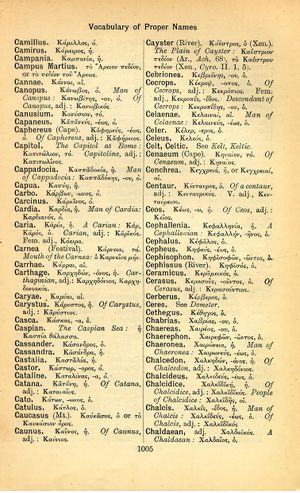Cato: Difference between revisions
(Names) |
(6_3) |
||
| Line 1: | Line 1: | ||
{{WoodhouseENELnames | {{WoodhouseENELnames | ||
|Text=[[File:woodhouse_1005.jpg|thumb|link={{filepath:woodhouse_1005.jpg}}]]Κάτων, -ωνος, ὁ. | |Text=[[File:woodhouse_1005.jpg|thumb|link={{filepath:woodhouse_1005.jpg}}]]Κάτων, -ωνος, ὁ. | ||
}} | |||
{{Lewis | |||
|lshtext=<b>Căto</b>: ōnis, m. 1. [[catus]],<br /><b>I</b> a [[cognomen]] of [[several]] [[celebrated]] Romans in the [[gens]] Porcia, [[Valeria]], Vettia al.<br /><b>I</b> M. [[Porcius]] [[Cato]] the [[elder]], [[distinguished]] as a [[rigid]] [[judge]] of [[morals]]; [[hence]] [[with]] the appel. Censorius; whose [[most]] [[celebrated]] works were the Origines and De Re Rustica, Cic. de Or. 3, 33, 135; Liv. 31, 1 sqq.; Plin. 7, 27, 28, § 100; 7, 30, 31, § 112; cf., [[concerning]] him, Bernhardy, Röm. Litt. p. 521 sq.; 650; Bähr, Lit. Gesch. p. 515; 258; 354 al.; Ellendt, Cic. Brut. p. xix.-xxv.—As appel. of a [[severe]] [[judge]], Mart. 1, prooem. fin.; Phaedr. 4, 7, 21.—Hence,<br /> <b>B</b> Cătōnĭānus, a, um, adj., of [[Cato]]: [[familia]], Cic. Q. Fr. 4, 6, 5: [[aetas]], Sen. Tranq. 7, 5: [[illa]] (i. e. praecepta), id. Ep. 94, 27: [[lingua]], i. e. of [[high]] [[morality]], Mart. 9, 27, 14.—<br /><b>II</b> His [[descendant]], M. [[Porcius]] [[Cato]] the younger, the [[enemy]] of Cœsar, [[who]] committed [[suicide]] [[after]] the [[battle]] of Pharsalia, at [[Utica]]; [[hence]] [[with]] the appel. Uticensis.—<br /> <b>B</b> Cătōnīni, ōrum, m., the adherents or friends of [[Cato]], Cic. Fam. 7, 25, 1; cf. [[catonium]].—Concerning [[both]], and the Porcian [[family]] in gen., v. Gell. 13, 20 Hertz, p. 19 Bip.—On [[account]] of [[their]] [[serious]] and [[austere]] [[character]], [[serious]], or [[gloomy]], [[morose]] men are called Catones, Sen. Ep. 120, 19; cf. Juv. 2, 40; Phaedr. 4, 7, 21; Petr. 132.—<br /><b>III</b> [[Valerius]] [[Cato]], a [[celebrated]] [[grammarian]] of [[Gaul]], and [[poet]] of the [[time]] of [[Sulla]], Cat. 56; Ov. Tr. 2, 436; Suet. Gram. 2; 4; 11.—<br /> [[Dionysius]] [[Cato]], [[author]] of the Disticha de moribus, prob. [[about]] the [[time]] of Constantine; v. the Disticha, [[with]] the Sententiae of [[Syrus]], at the [[end]] of the Fabulae of [[Phaedrus]], Bip. | |||
}} | }} | ||
Revision as of 08:24, 13 August 2017
English > Greek (Woodhouse)
Κάτων, -ωνος, ὁ.
Latin > English (Lewis & Short)
Căto: ōnis, m. 1. catus,
I a cognomen of several celebrated Romans in the gens Porcia, Valeria, Vettia al.
I M. Porcius Cato the elder, distinguished as a rigid judge of morals; hence with the appel. Censorius; whose most celebrated works were the Origines and De Re Rustica, Cic. de Or. 3, 33, 135; Liv. 31, 1 sqq.; Plin. 7, 27, 28, § 100; 7, 30, 31, § 112; cf., concerning him, Bernhardy, Röm. Litt. p. 521 sq.; 650; Bähr, Lit. Gesch. p. 515; 258; 354 al.; Ellendt, Cic. Brut. p. xix.-xxv.—As appel. of a severe judge, Mart. 1, prooem. fin.; Phaedr. 4, 7, 21.—Hence,
B Cătōnĭānus, a, um, adj., of Cato: familia, Cic. Q. Fr. 4, 6, 5: aetas, Sen. Tranq. 7, 5: illa (i. e. praecepta), id. Ep. 94, 27: lingua, i. e. of high morality, Mart. 9, 27, 14.—
II His descendant, M. Porcius Cato the younger, the enemy of Cœsar, who committed suicide after the battle of Pharsalia, at Utica; hence with the appel. Uticensis.—
B Cătōnīni, ōrum, m., the adherents or friends of Cato, Cic. Fam. 7, 25, 1; cf. catonium.—Concerning both, and the Porcian family in gen., v. Gell. 13, 20 Hertz, p. 19 Bip.—On account of their serious and austere character, serious, or gloomy, morose men are called Catones, Sen. Ep. 120, 19; cf. Juv. 2, 40; Phaedr. 4, 7, 21; Petr. 132.—
III Valerius Cato, a celebrated grammarian of Gaul, and poet of the time of Sulla, Cat. 56; Ov. Tr. 2, 436; Suet. Gram. 2; 4; 11.—
Dionysius Cato, author of the Disticha de moribus, prob. about the time of Constantine; v. the Disticha, with the Sententiae of Syrus, at the end of the Fabulae of Phaedrus, Bip.

